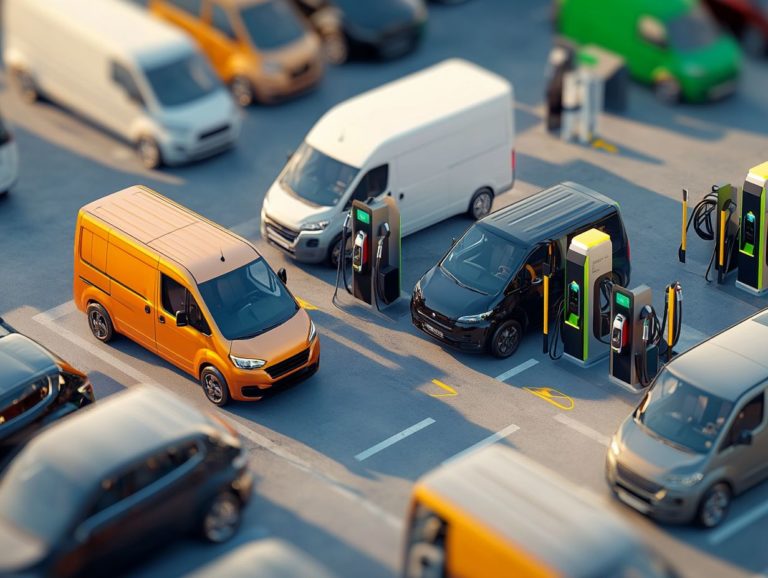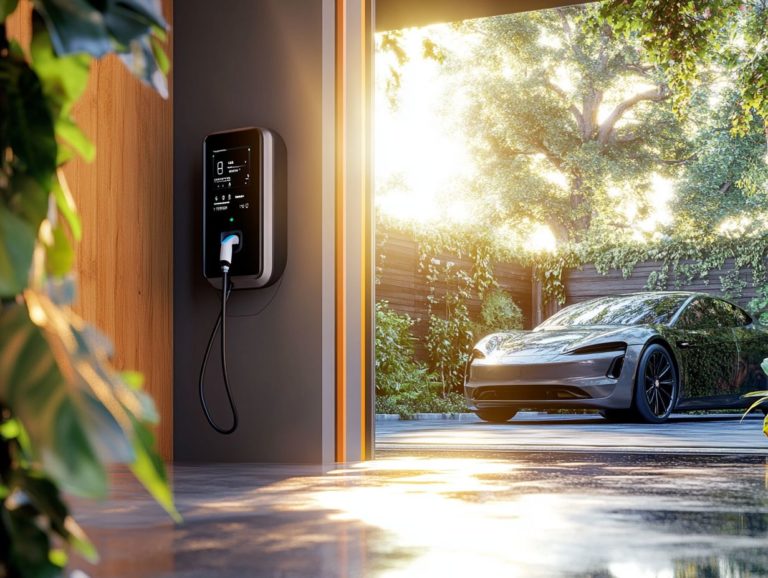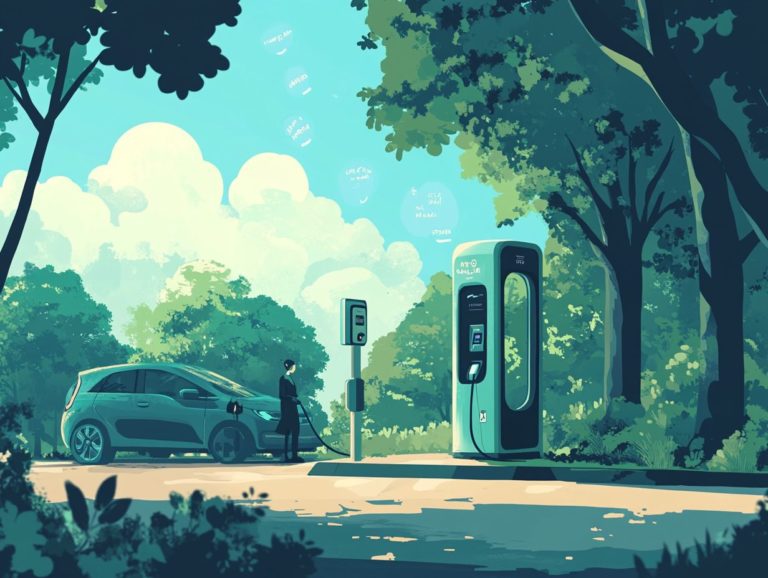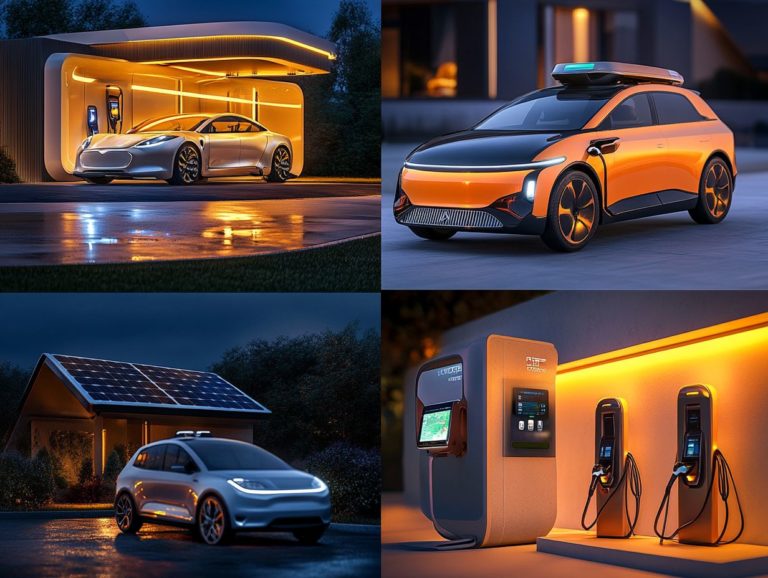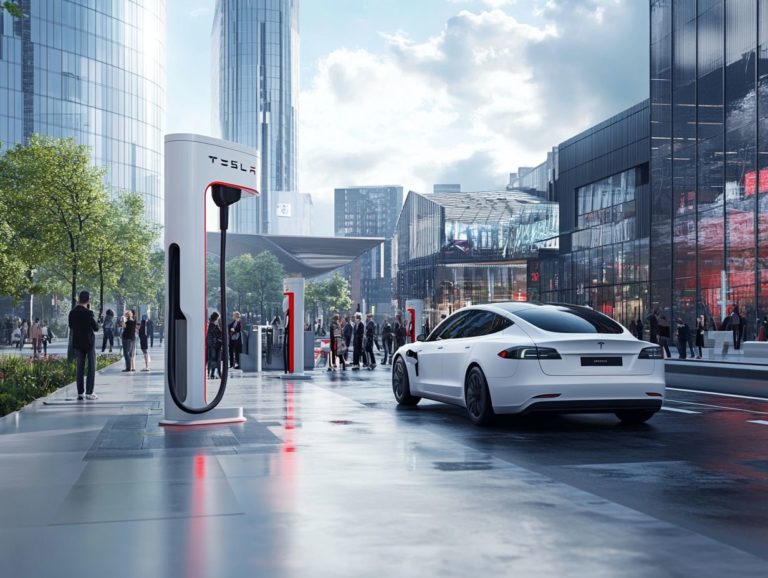how to install a home ev charging station
Electric vehicles (EVs) are becoming increasingly popular. Convenient home charging solutions are now more important than ever.
Installing a home EV charging station can transform your driving experience, offering both efficiency and peace of mind.
This article explores what a home EV charging station is, the many benefits it provides, and the different types available.
It also covers the installation process, key considerations, and maintenance tips to ensure your charging station operates smoothly for years to come.
Are you ready to revolutionize your EV journey? Let s explore how a home charging station can transform your driving experience!
Contents
- Key Takeaways:
- Types of Home EV Charging Stations
- Installation Process
- Assessing Your Home’s Electrical System
- Permits and Regulations
- DIY vs. Professional Installation
- Factors to Consider Before Installing
- Maintaining and Troubleshooting Your Home EV Charging Station
- Frequently Asked Questions
- What is a home EV charging station and why is it important?
- What factors should I consider before installing a home EV charging station?
- Can I install a home EV charging station myself?
- How do I choose the right home EV charging station for my electric vehicle?
- Do I need to make any upgrades to my home’s electrical system for a home EV charging station?
- Are there any government incentives or rebates available for installing a home EV charging station?
Key Takeaways:
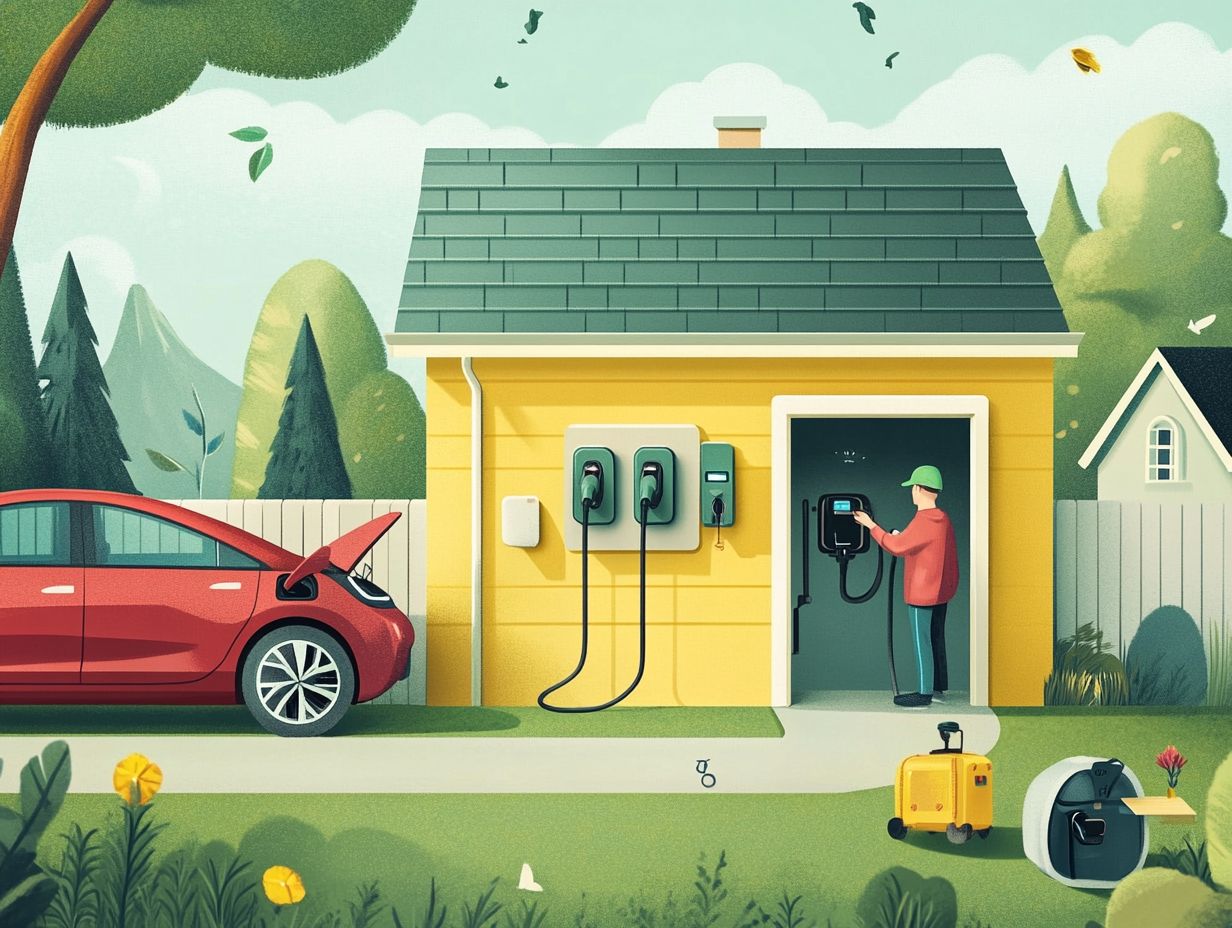
Installing a home EV charging station offers convenience, saves you money, and helps reduce your carbon footprint.
When choosing your station, think about cost, vehicle compatibility, and future needs.
Proper maintenance and troubleshooting are essential for the longevity and efficiency of your home EV charging station.
What is a Home EV Charging Station?
A home EV charging station is your easy solution for electric vehicle charging right at home. This dedicated unit uses your existing electrical wiring, ensuring a seamless blend of efficiency and safety.
Typically featuring a Level 2 charger, it can significantly reduce your charging time compared to standard 120V outlets. This isn t just a convenience; it’s a major step towards sustainable living. You can reliably charge your vehicle while actively reducing your carbon footprint and supporting the shift to electric mobility.
A home charging station usually includes everything you need to charge your vehicle safely and efficiently. While Level 2 chargers are the popular choice for residences due to their speed and efficiency, you might also consider a Level 3 charger for extra power best suited for commercial use.
Choosing reputable brands like EvoCharge and ChargePoint is important. They offer advanced safety features and user-friendly designs. It s wise to have a qualified electrician handle the installation to ensure compliance with local codes and safety regulations.
Consider the station’s location and protection from environmental elements. The advantages of having a home charging solution extend beyond mere convenience and cost savings over public charging stations.
There’s peace of mind in charging your vehicle overnight. You can wake up each day with a full battery, ready to hit the road.
Benefits of Installing One
Installing a home EV charging station brings numerous benefits that enhance your experience as an EV owner. It not only boosts your daily convenience but also optimizes energy efficiency and helps lower your utility bills.
With a dedicated charging solution at home, you can charge your vehicle overnight, ensuring it s ready for your daily adventures without searching for public chargers. Many utility companies offer incentives for installing charging stations, further decreasing your installation costs and supporting your move to cleaner transportation.
This setup simplifies the charging process, making it easy to keep your battery full while also leading to significant cost savings over time. By charging during off-peak hours, you can benefit from lower electricity rates, ultimately reducing your monthly bills.
If you utilize renewable energy sources like solar power, you enhance your positive environmental impact, positioning yourself as an active supporter of sustainability.
Having a dedicated home charging setup enriches your overall ownership experience, providing peace of mind and reducing your reliance on public charging infrastructure.
Start your journey towards easy, efficient EV charging today!
Types of Home EV Charging Stations
Home EV charging stations come in various types, mainly classified as Level 1, Level 2, and Level 3 chargers. Each type is designed to meet the unique charging needs of electric vehicle (EV) owners.
Level 1 chargers use a standard 120V outlet and are perfect for occasional charging. In contrast, Level 2 chargers require a 240V outlet and offer a more efficient home charging solution for those who desire quicker power-ups.
Then there are Level 3 chargers, known for their impressive DC fast charging capabilities. While these chargers are typically found at public locations, they can be installed at home if the necessary infrastructure is in place.
Level 1 vs. Level 2 Charging
When comparing Level 1 and Level 2 charging, key differences revolve around charging rates and the time it takes to fully charge your EV. These factors significantly impact your overall experience.
Level 1 chargers plug into a standard 120V outlet, delivering a slower charging rate, making them ideal for those who drive shorter distances daily. In contrast, Level 2 chargers utilize a 240V outlet, dramatically reducing charging time. Imagine charging your EV overnight with ease!
The technical differences between these two options become especially clear in everyday use. For example, while Level 1 charging typically adds about 4-5 miles of range per hour, Level 2 can provide anywhere from 10 to 60 miles in the same period, depending on the specific charger and vehicle compatibility.
This makes Level 2 a game-changer for busy individuals who often need quick power-ups during the day. Meanwhile, Level 1 might suffice for homeowners who prefer to leave their cars plugged in for extended periods, especially in urban environments.
Cost and Features Comparison
The cost and features of home EV charging stations can vary significantly, reflecting the wide array of charger options available today from basic models to advanced systems equipped with smart technology.
Installation costs may fluctuate based on factors like electrical service upgrades, necessary permits, and specific charger attributes, such as features that allow electricity to flow both ways, letting you use your car as a power source, and cable management systems that simplify charging for you as an EV owner.
As a prospective buyer, weighing the long-term advantages of particular units is crucial. Some chargers may provide faster charging times and improved energy efficiency, ultimately lowering your electricity bills.
Evaluating different charger options, including Level 1 and Level 2 chargers, is essential to understand how each type aligns with your lifestyle and driving habits.
Selecting the right charging solution not only enhances your user experience but also adds convenience and value to your property over time, making it an essential decision for any EV owner.
Installation Process
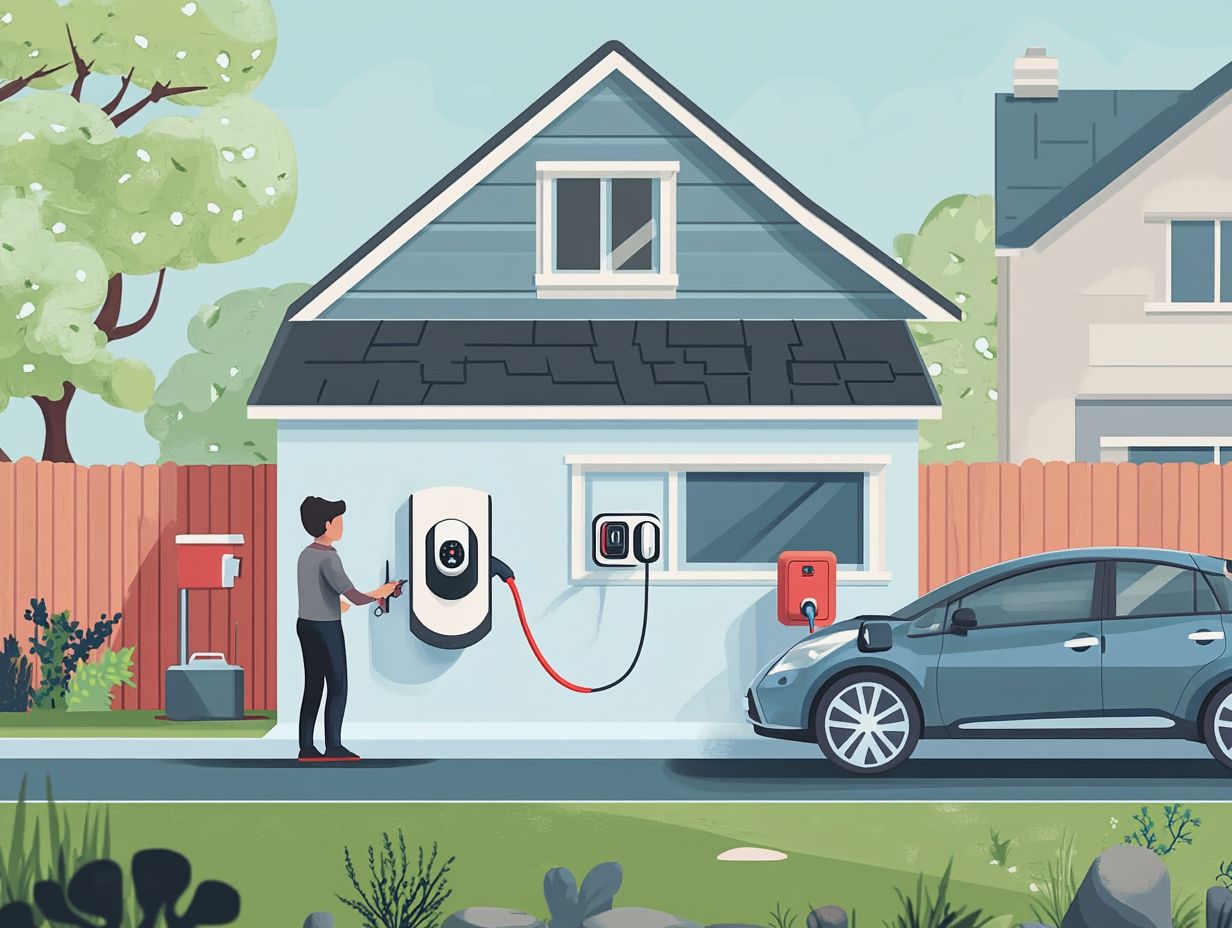
The installation process for a home EV charging station requires careful attention to several critical steps to ensure a seamless setup, safety, and adherence to local regulations. Additionally, it’s important to understand how to use a public EV charging station for when you’re on the go.
As an EV owner, it s essential to understand these requirements and plan effectively. Start by assessing your existing electrical wiring; this step is vital in determining whether your home can accommodate the desired charging solution, whether it’s a Level 2 charger or a more intricate installation.
Securing the necessary permits and consulting professionals can significantly streamline the process, helping you avoid potential complications down the line.
Consider investing in a home EV charging station today! It can enhance your lifestyle and overall convenience.
Assessing Your Home’s Electrical System
Assessing your home’s electrical system is an essential first step in determining whether you can install a home EV charging station. To ensure you can support the extra load from an electric vehicle supply equipment (EVSE), consider how to plan your EV charging strategy.
This evaluation involves checking your existing service capacity and identifying any necessary upgrades. Ensure everything is compatible with your chosen charging station, whether it’s a Level 2 charger or another option.
A close look at your electrical system provides valuable insights into its overall condition. You can understand if any modifications are required for optimal performance.
Evaluating your service capacity is crucial! Check the amperage rating to prevent any circuit overloads. Identifying upgrades, like enhancing your circuit breaker panel or upgrading wiring, will ensure your system meets the increased power demands.
Compatibility with EV charging solutions is equally important. It guarantees efficient operation and safety. These steps streamline the installation process and enhance the longevity and reliability of your home’s electrical infrastructure.
Permits and Regulations
Navigating the intricate landscape of installation permits and regulations is essential for anyone considering a home EV charging station. Before making a decision, it’s important to understand what to know before buying an EV charger. Ensuring compliance guarantees safety and legality while maximizing your electric service’s efficiency.
Different regions may impose varying requirements, so it’s wise to consult local authorities or a licensed electrician. This will streamline the process and help you sidestep potential setbacks.
Regulations often encompass electrical codes, zoning laws, and homeowners association guidelines that dictate how and where your charging station can be installed. Securing the right permits protects you from future legal issues and can boost your property’s overall value.
Know the required documents, including electrical permits and inspections. These can differ significantly from one jurisdiction to another. Ultimately, adhering to local laws is vital for reaping the benefits of sustainable driving while avoiding unforeseen complications along the way.
DIY vs. Professional Installation
When considering the installation of a home EV charging station, one crucial decision is whether to take the DIY route or enlist the help of a professional. Each option carries its own set of advantages and challenges.
Opting for DIY can save you initial costs and offer flexibility, but it requires a solid grasp of electrical systems and safety measures. Professional installation typically ensures compliance with regulations and maximizes your charging station’s performance.
If you have a knack for technology, a DIY project can be a fantastic opportunity to learn and customize your charging setup according to your preferences. However, consider potential expenses for tools, permits, and fixing any mistakes along the way.
Conversely, professional installation provides a safety guarantee by reducing the risks associated with electrical work. There’s peace of mind in having a certified technician handle the job.
Weighing these factors is essential for making an informed decision that aligns with your budget and safety standards.
Factors to Consider Before Installing
Before installing a home EV charging station, consider several essential factors. Evaluate the cost to ensure it fits within your budget.
Check compatibility with your electric vehicle and think about future-proofing your charging setup. By carefully assessing these elements, you can ensure that your chosen charging solution meets your current needs and adapts to future demands.
This thoughtful approach will facilitate seamless charging management and enhance the longevity of your installation.
Start your assessment today to ensure a safe and efficient charging experience!
Cost and Budget
Understanding the installation cost for a home EV charging station is crucial for your budgeting process. Prices can vary greatly depending on the type of charger, any necessary electrical upgrades, and available utility incentives.
Evaluate these factors to make informed decisions that suit your financial situation while securing an efficient charging solution.
Installation costs can increase if extensive rewiring or permits are needed. Budget considerations also play a significant role.
Weigh the benefits of a Level 2 charger, which typically offers faster charging times, against the more economical Level 1 options. Also, explore potential rebates and incentives from local utilities to reduce your initial costs.
Compatibility with Your Vehicle
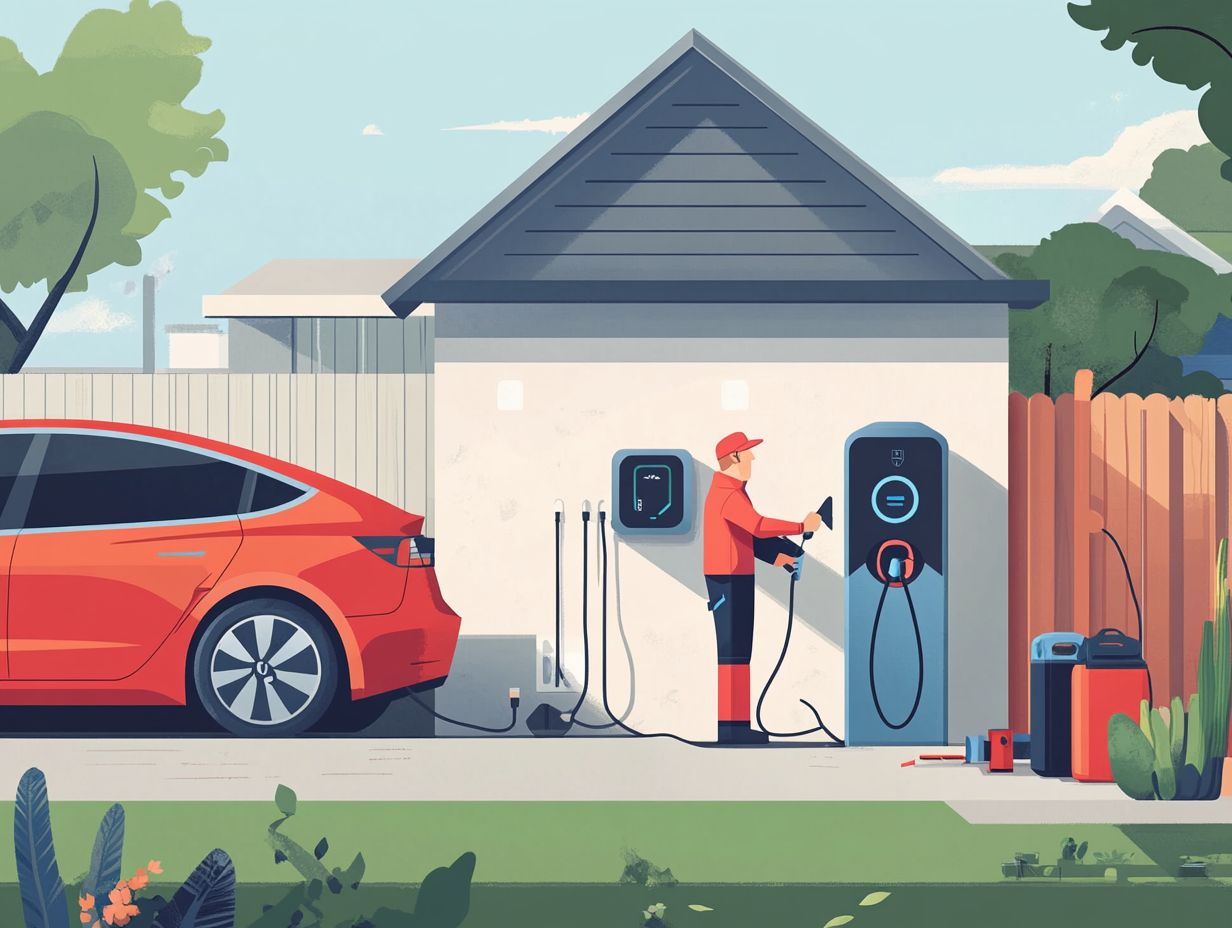
Ensuring compatibility between your home EV charging station and your vehicle is essential. Different electric vehicles (EVs) may use various charging methods or plugs, such as the J1772 standard.
Verify that the charging station you choose accommodates your specific vehicle model. Neglecting this could lead to inefficient charging or even incompatibility.
Some vehicles may need a Type 2 connector, while others might use CCS or CHAdeMO standards. Choosing Level 2 chargers can significantly enhance your charging speeds.
Familiarize yourself with these charging methods and plug types. This ensures your home setup meets both your immediate needs and long-term goals for reliable EV charging.
Future-proofing Your Setup
Future-proofing your home EV charging setup is essential with advancements in technology. For instance, charging systems that can send power back to the grid can enhance your installation’s functionality and longevity.
Select a flexible charging solution that adapts to the evolving landscape of electric vehicles (EVs). This choice ensures that your charging station remains relevant for years.
Think ahead about upcoming EV models that may use newer charging standards or faster battery technologies. Investing in versatile chargers compatible with various brands maximizes your investment.
Explore advancements in smart charging solutions. These include grid interaction and energy management systems that can elevate your setup.
Maintaining and Troubleshooting Your Home EV Charging Station
Maintaining and troubleshooting your home EV charging station is essential for optimal performance. Regular checks of electrical wiring, connections, and software updates help prevent disruptions.
This diligent approach enhances charging efficiency, ensuring your station operates at its peak.
Tips for Proper Maintenance
Regular maintenance is crucial for ensuring the charging efficiency of your home EV charging station. This helps extend the life of your equipment while minimizing potential safety hazards.
Simple practices, such as inspecting the charging cable for wear and tear, ensuring the charging station is free from debris, and keeping the software updated, contribute to optimal performance.
Monthly checks on the unit’s ventilation can prevent overheating, which is vital for maintaining safe operation. Make sure to check out the troubleshooting guides provided by the manufacturer to address minor issues swiftly.
Periodically reviewing your charging settings can help optimize charging times based on your usage patterns. This may reduce costs and enhance efficiency. Engaging in these straightforward maintenance practices not only safeguards your hardware but also ensures your investment meets your daily energy needs without unexpected interruptions.
Common Issues and How to Address Them
Common issues with home EV charging stations can often be fixed easily with simple troubleshooting steps. This enables you, as an electric vehicle (EV) owner, to maintain your charging solutions without needing professional help.
Problems like slow charging, power outages, or connectivity hiccups are frequently resolved by checking circuit breakers and inspecting connections. Ensuring that your charging station is properly configured is also essential.
You might encounter challenges such as tripped circuit breakers, incompatible plugs, or software glitches in your home charging system. Recognizing these common pitfalls allows you to take proactive measures.
For example, if you notice unexpected slow charging, check your car s settings. In the event of a power outage, confirming the operational status of your station becomes essential.
Safety is key. Ensure your charging unit is weatherproof for outdoor use and meets all electrical requirements to prevent any mishaps.
By following these steps, you can significantly extend the longevity and effectiveness of your home charging station.
Frequently Asked Questions
What is a home EV charging station and why is it important?
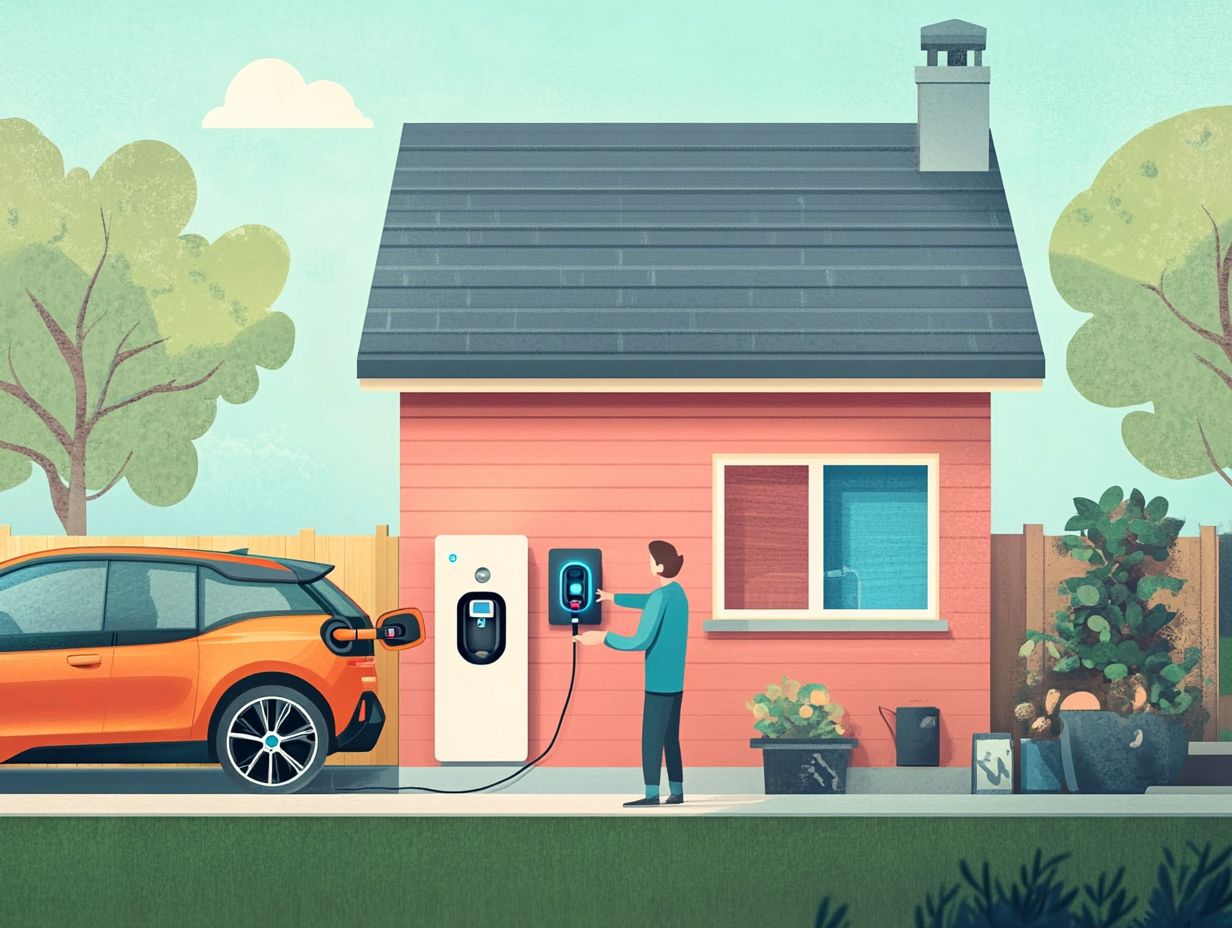
A home EV charging station lets you charge your electric vehicle safely and conveniently at home.
What factors should I consider before installing a home EV charging station?
Consider the type of charging unit and power level compatible with your electric vehicle, the location of your home’s electrical panel, and any necessary permits or regulations in your area.
Can I install a home EV charging station myself?
While you can install a home EV charging station yourself, it is recommended to hire a licensed electrician for the installation. This ensures the safety and proper functioning of the charging station, as well as a clear understanding of the cost of home EV charging.
How do I choose the right home EV charging station for my electric vehicle?
The right home EV charging station depends on the make and model of your vehicle, as well as your personal charging needs. Research and compare different charging units to find one that is compatible and meets your requirements.
Do I need to make any upgrades to my home’s electrical system for a home EV charging station?
In some cases, you may need to upgrade your home’s electrical system to support a home EV charging station. This could include adding a dedicated circuit or increasing electrical capacity. To understand what types of homes are best for EV charging, consult a licensed electrician to determine if any upgrades are needed.
Are there any government incentives or rebates available for installing a home EV charging station?
Yes, some governments offer incentives or rebates for installing a home EV charging station. Research and inquire about these programs in your area to see if you are eligible.
Start your EV home charging journey today for a smoother ride!

